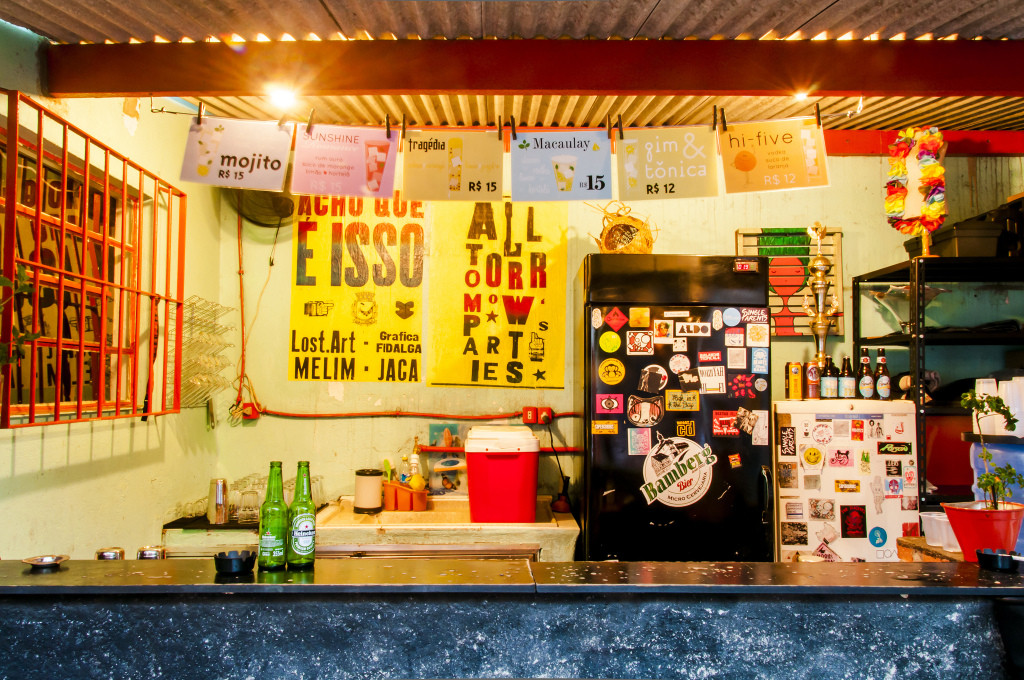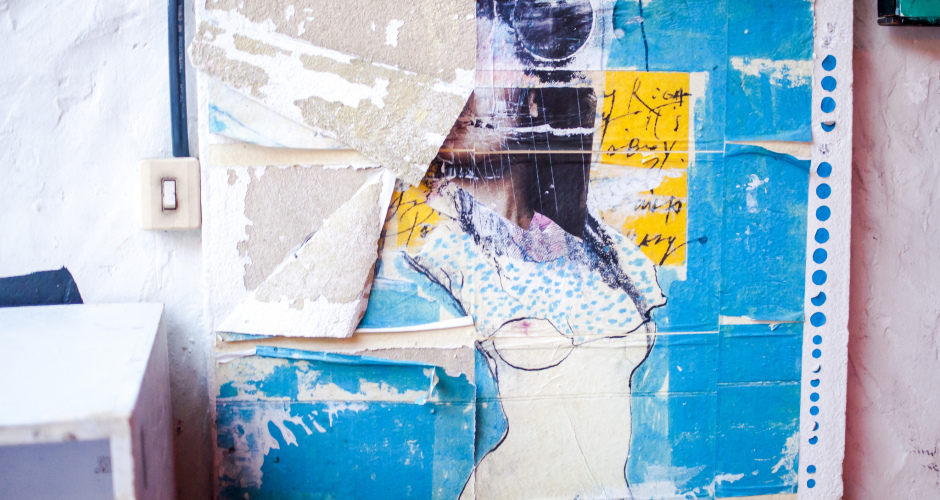Gaia Passerelli was in my class at Book Passage this year; I’m happy to share her write up of her neighborhood in São Paulo, Brazil.
Vila Madalena has changed a lot. The place where I grew up is now São Paulo’s bohemian centre. “One of the coolest neighbourhoods in the world” according to National Geographic Traveller. But walking Vila’s streets, I recognise houses, graffiti, hidden passages. I can even spot what’s cool amongst all the plastic vibe. It may have changed, but I’m still a local.
Until the late 1960s, Vila Madalena was no more than some hills in São Paulo’s west zone, just above Pinheiros area. Then, during the 70s and 80s, it was adopted by intellectuals, musicians and filmmakers, earning a long lasting bohemian badge. It was in the 90s that the scene changed, with restaurants and design stores entering the domain of left-wing botecos and changing the landscape forever. In the 00s transformation went full blast, and all sorts of bars and stores invaded Madalena’s streets.
During the 2014 World Cup things got seriously out of control and Vila Madalena became a young adult who can’t hold the booze. It is Barcelona’s Ramblas, Dublin’s Temple Bar and Austin’s 6thStreet district right on my backyard. Carnival season now is the seventh circle of hell. Families are moving. Homes are losing space to more shops, more bars. The house of a family I once knew was demolished and gave space to a sports store.
 The hype comes from Vila Madalena being a very democratic area. People are crowding the streets because there’s something for everyone. It is a place where a traditional joint such as Bar das Empanadas (where underground filmmakers congregated during the dictatorship years) stands in front of an expensive 24 hour bakery. A fancy seafood restaurant shares the block with a Wicca-themed hostel. There are soccer fans are drinking chope and rich girls are sipping oysters and Champagne. As families are having pastel at the morning feira, hipsters are riding fixed gear bikes on their way to organic coffee.
The hype comes from Vila Madalena being a very democratic area. People are crowding the streets because there’s something for everyone. It is a place where a traditional joint such as Bar das Empanadas (where underground filmmakers congregated during the dictatorship years) stands in front of an expensive 24 hour bakery. A fancy seafood restaurant shares the block with a Wicca-themed hostel. There are soccer fans are drinking chope and rich girls are sipping oysters and Champagne. As families are having pastel at the morning feira, hipsters are riding fixed gear bikes on their way to organic coffee.
Sounds cool, but it comes at a price. Just try to walk Rua Aspicuelta on any given Saturday night, and you’ll notice there’s way too many cars, people, garbage. The atmosphere is plastic, lifeless, loud. Bars try to emulate a bohemian lifestyle already lost. They all look and feel the same. We even have some office buildings with foreign names.
But I’m still here. And so is Casa do Mancha (Portuguese for “Mancha’s home”), a cool, colourful and welcoming ground-level house resisting the crowds outside. Lacking identification at the door, it is a place that proves the multiplicity of São Paulo. It was once Manoel Mancha’s home, literally, back in 2005 when he moved from the countryside and found a place to live in a small street in Vila Madalena’s heart.
Now, it is an entity with needs and feelings of its own. Managers Mancha and Tomás, who work together in their production company, mention the house as a third person. Casa requests, they do. And sometimes Casa requests that they open the doors for about a hundred people to hang out, drink, smoke and enjoy live music. It usually happens on weekends, from seven to eleven PM. Doors are open to the public, and local indie bands play for a small audience.
Casa hides inside Vila’s busiest streets; the place is hard to find. “Só vai quem já foi”, as we say in Portuguese, something like “you can only go if you been there before”. If it’s not your case, your best bet is to find a friend who knows the place and knock on the door. You may not get inside if already too crowded, other than that the atmosphere is as friendly as can be. It’s a small and welcoming place, where I and you can sit on the couch, have a drink, dance, use the sole bathroom, smoke in the small front yard.
The time to arrive is around 8 PM. Once inside, you’ll feel at a house party with people chatting around colourful cocktails in plastic glasses. The drinks are all cheap and delicious, with names like Macaulay and Tragédia. The mojito is my favourite, especially on a hot summer night. Endless stickers and scribbles of local bands decorate the small bar. Christmas lighting hangs on the walls. Graffiti and posters and paintings are all over. There’s a living room with chairs, band equipment and piano. And that’s pretty much it.
I ask Mancha if he noticed any changes to the public coming to occasional indie shows at his place. “I can’t measure if changing happens because we’ve been doing this for some time, or if it comes from what’s happening in the neighbourhood.” Tomas defines: “When we started Vila Madalena was already what it is today, a little decadent. But people who come here are not walking through the street and see a small bar and enter and sit down. Our gate is always closed.”
Mancha and Tomas are thirty-somethings lodgers personifying the multi-tasking professionals of their generation. On a daily basis, they embody roles of managers, mixologists, curators, accountants, decorators, musical producers, video directors. Their laid-back attitude doesn’t translate the importance Casa has in São Paulo’s music scene. The place is an heir of Vila Madalena’s cultural identity. The bands playing are local, authorial and experimental, with names like Chinese Cookie Poets and Far from Alaska.“
Casa is a music producing company. And one of the things this company produces are parties,” says Mancha. “There was a moment when we had to understand what was going on, that there were bands in need of space”, explains Tom. Even after finding record labels and enjoying some success, bands like Hurtmold, Garotas Suecas and Holger keep playing on the plaid floor of the living room. It is the physical manifestation of the Casa’s intent of weighting artists in the same height of the crowd, to approximate musicians and public. They play in a down-to-earth, fun environment, where everyone is a friend or a friend of your friend.“
Most of the public is people who just enjoy the music, like us,” notes Mancha. “One thing we understood is that who wants to, ends up discovering about it. Someone may ignore we exist, sure. But say someone’s a fan of [TV on the Radio guitarist and Mancha regular whenever in São Paulo for record shopping], Kyp Malone. That person will hear that the guy is playing an extra gig in São Paulo at our place. And will show up.”
How? The address may be secret, but Facebook updates whenever something is about to happen. If you want, you’ll find your way.*
All photos: Rafael Roncato
Gaia Passarelli blogs in English and Portuguese (damn!) at How to Travel Light and she’s on Instagram, too, at gaiapassarelli.

